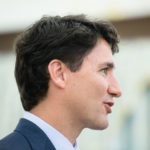
By Trevor Parry
Special to the Financial Independence Hub
Prime Minister Justin Trudeau, in his dogged defense of what are the most fundamental tax proposals made since the report of the Carter Commission (which gave us our modern Income Tax system) claimed last Thursday that it is wrong that someone earning $50,000 a year as salary pays more in tax than someone earning $300,000 in their corporation.
Many tax professionals have dissected this ridiculous statement and could in considerable detail discuss where Mr. Trudeau was in error. In simple terms Mr. Trudeau would have you believe that the corporate shareholder lives in a different world where they are not affected by personal taxation.
According to the Ernst & Young tax Calculator an Ontario resident earning $50,000 would pay just under 30% on their income or $8,311 in taxation. The Ernst & Young Tax Calculator can’t factor in the value of a company or government funded health benefits program or pension plan.
If we turn to the corporate tax result, an active business earning $300,000 of profit in Ontario would be subject to taxation at 15%. We don’t need a sophisticated tax calculator to determine that this equates to $45,000. One should be baffled.
Corporate income also attracts personal taxation
Mr. Trudeau also is comparing apples and oranges. Does the entrepreneur who owns the business pay themselves anything? Regardless of whether they take income as salary or dividends it will attract personal taxation. Let’s say that they took a salary of $50,000, the same as Mr. Trudeau’s downtrodden employee. They would also have paid $8,311 in tax.
They might have had to pay themselves considerably more in order to afford an RRSP contribution, as it is highly unlikely they have a pension plan in place. If they decided to invest that $300,000 in their corporation any income or growth on that asset would be taxed almost at the same rate as an individual and when they withdraw the money as a dividend they would pay tax at the rate of 45.3%.
Perhaps the shareholder is as malevolent as Mr. Trudeau and “Red” Billy Morneau believe and they are deducting all of their lifestyle costs, including mortgage, food, transportation, vacations, toothpaste, etc. as a corporate expense. They would be guilty of tax evasion and the Criminal Code has provisions for dealing with that.
A terrible conundrum
One is left with a terrible conundrum. Justin Trudeau is the Prime Minister, elected with a tremendous majority, promising Sunny Ways and a departure from the controlling governance of that Necromancer Stephen Harper. Mr. Trudeau must have a working knowledge of how Canada’s tax system works, for he has an interest in numbered companies that hold his investments related to his generous inheritance and to which his many speaking fees that he earned before and whilst he became a simple MP were likely paid. How could Mr. Trudeau be so wrong on the simple math? The business owner pays considerably more than the salaried employee, now and in the future.
If the average Canadian voter can clearly see that Mr. Trudeau is dreadfully mistaken in his statement the question that follows must be, why? Mr. Trudeau is a busy man: he surely can’t take time away from governing, publicity or his study of quantum physics to understand the byzantine workings of Canadian income tax, and surely his advisors can brief him on simple mathematics as well as tax matters. Therefore Mr. Trudeau is either dreadfully advised, incapable of understanding that of which he purports to speak with conviction to Canadians, or he is very clearly lying.
I leave it to the Canadian voter to decide which is right.
 Trevor Parry is the President of the TRP Strategy Group, specializing in owner manager tax and compensation planning, executive compensation, philanthropic strategies, enhanced retirement planning and professional corporation planning. Trevor was formerly the National Sales Director of GBL, a boutique actuarial consulting firm. In addition to his practice he speaks and writes extensively on financial strategy, planning and tax issues.
Trevor Parry is the President of the TRP Strategy Group, specializing in owner manager tax and compensation planning, executive compensation, philanthropic strategies, enhanced retirement planning and professional corporation planning. Trevor was formerly the National Sales Director of GBL, a boutique actuarial consulting firm. In addition to his practice he speaks and writes extensively on financial strategy, planning and tax issues.



Problem is, he would need to admit fault to change his position. And let’s face it, regardless of the ACTUAL amount paid, he would simply point to the 30% vs. 15% tax rate to make his argument “correct”. Taxing the “rich” is an easy argument to make for any politician and unfortunately, this current government wants it to replace hockey as our national sport!
Excellent comment Trevor, and much needed in the public eye.
What is perhaps even more astounding (and disturbing!), is the mainstream media is apparently unable, or unwilling, to point this out to the viewing public. In my opinion, probably a mix of both – the former because many people admit that they go in to the media business because they “can’t do math”; and the latter because the same people are still – incredibly – fawning over this “leader” like a teeny-boppers over a pop star.